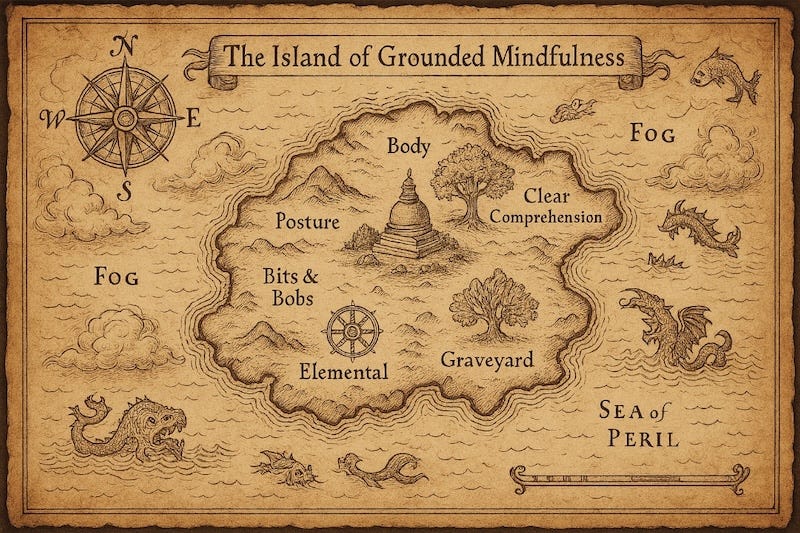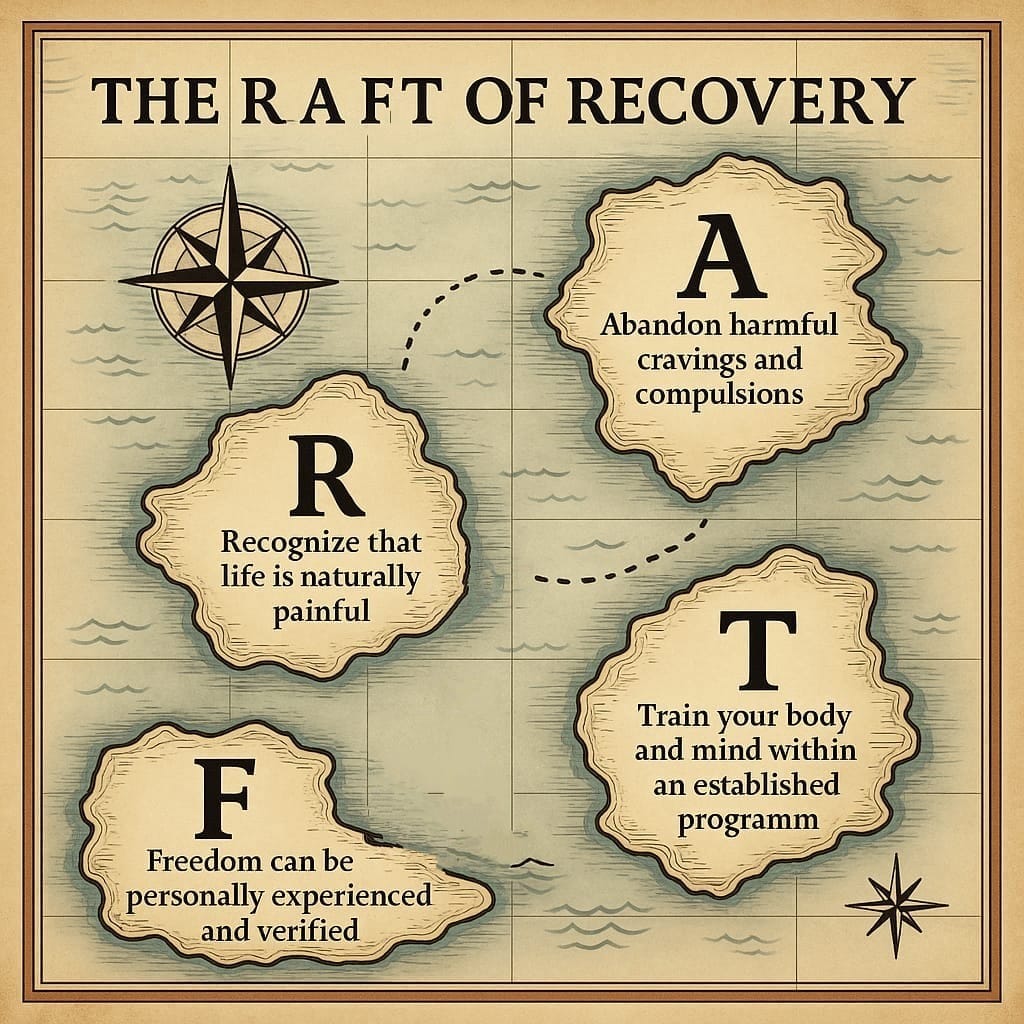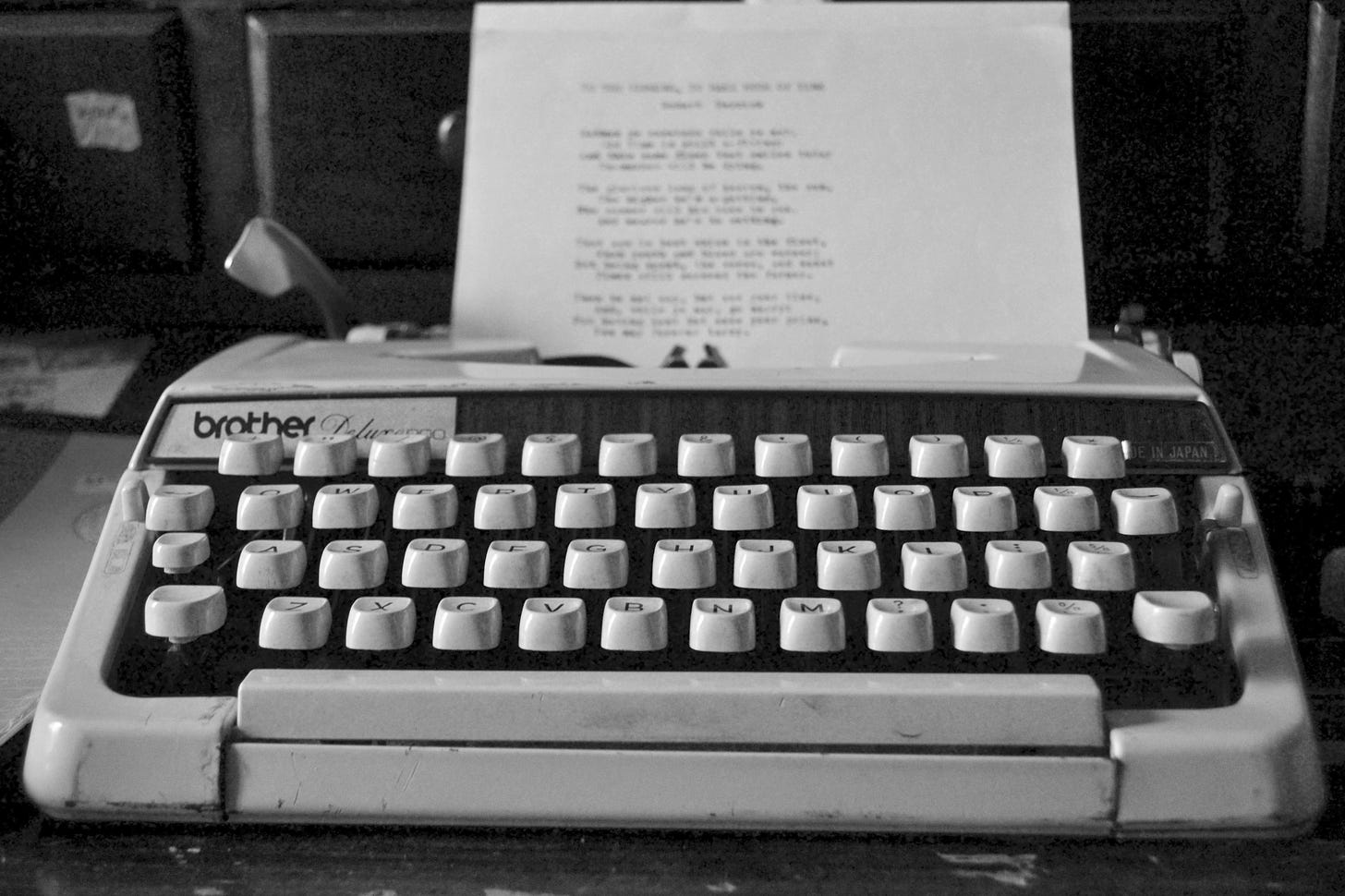Setting off on a RAFT to Recovery
INTRODUCING THE RAFT FRAMEWORK WORKBOOK
As we change the direction of our life
by Dr Cathryn Jacob & Vince Cullen
Welcome!
Taking this step, opening this workbook, shows you have courage and a deep longing for change. If you are struggling with addiction, harmful compulsions or patterns that cause suffering, know that you are not alone, and that a path towards freedom and genuine wellbeing exists.
This RAFT to Recovery Workbook has been designed to be your practical guide and companion on that journey. It draws on the profound wisdom of early Buddhist teachings, in particular the core insights that Gotama – the man we now know as the Buddha – life’s, pain, difficulties and disappointments, as experienced by himself and for others.
And what is the power of mindfulness? It’s when a noble disciple is mindful. They have utmost mindfulness and alertness, and can remember and recall what was said and done long ago. This is called the power of mindfulness
– Gotama, the Buddha
In the next chapter, we will explore why Gotama intentionally became homeless, giving up privileged status and lavish comforts, leaving behind his wife, newborn son and parents. After six years of exploration, Gotama realised something profoundly simple, so obvious and yet blindly overlooked: there is pain.
Let’s be very clear, Gotama did not say ‘life is suffering’; he simply stated that pain exists. In writing this workbook, we have aimed to enhance and support his perspectives with those from contemporary neuroscience, psychology and philosophy to offer a comprehensive approach to healing and transformation.
How do we cross the waters from danger to safety? Gotama Buddha suggested that we need to build a raft – a vessel we skilfully construct using whatever materials are available to us.
– RAFT to Recovery
In the first talk he gave after awakening to life as it is, Gotama presented four important realities.… ⁂
– This is the first part of the introduction to The RAFT to Recovery Handbook by Vince Cullen and Dr Cathryn Jacob. Download the complete first chapter. This book is expected to go on sale during 2026.
What are your thoughts on, or your experience of, recovering from addiction? How did secular dharma help you in this process?
Of course, please start by liking, following, and (if you’re not already) subscribing to News from Tuwhiri. ⁂
GOOD TROUBLE
Buddhist Coalition for Democracy
Buddhist Coalition for Democracy is a non-denominational Buddhist non-profit that was set up in March 2025 to serve as a vehicle for Buddhists to support democratic norms, institutions and processes in their moment of peril.
With more than 800 members from a variety of Buddhist traditions, including Insight Meditation, Pure Land, Secular Buddhism, Soka Gakkai, Theravada, Vajrayana and Zen, they hold that democratic governance is the best method yet devised for:
ensuring the dignity and fundamental rights of all persons;
enabling all members of society to lead meaningful and fulfilling lives; and
settling passionately-held differences of opinion through peaceful means.
Photo taken during the No Kings protest, Philadelphia, 26 June 2025
Members commit to supporting democracy with methods that are consistent with Buddhist principles of wisdom, compassion, and right speech by nonviolent means.
https://buddhistcoalitionfordemocracy.org
Here’s why Jonathan Golden supports Tuwhiri:
The explosion of Buddhist thought in the West is one of the most exciting phenomena of the last fifty years. The secular and engaged nature of Tuwhiri’s work and publications is providing an important space for its exploration, one I am happy to support.
Thank you Jonathan. ⁂
FREE ONLINE COURSE
Exploring key concepts of secular dharma
Secular Buddhist Network offers a free online course twice a year in which participants can explore key concepts in a secular approach to the dharma.
Aspects discussed include the historical development of secular Buddhism, the four tasks of a secular Buddhist, a secular understanding of the eightfold path, the role of meditation in a secular dharma path, as well as the importance of social engagement in creating a flourishing life for all.
The course will run from 15 September through 24 November 2025. Zoom meetings with instructors will occur on the last scheduled day for each module.
Register for the course that will be starting Fall (Autumn) 2025.
TWO POEMS
Pity the nation #1
by Khalil Gibran (1933)
Pity the nation that acclaims the bully as hero, and that deems the
glittering conqueror bountiful.
Pity the nation that despises a passion in its dream, yet submits in its
awakening.
Pity the nation that …
Pity the nation #2
by Lawrence Ferlinghetti (2007)
after Khalil Gibran
Pity the nation whose leaders are liars,
whose sages are silenced,
and whose bigots haunt the airwaves.
Pity the nation that raises not its voice,
except to praise conquerors
and acclaim the bully as hero
and aims to rule the world
with force and by torture.
Pity the nation that …
– Download and savour these two wonderful poems in full – so appropriate for these difficult times. ⁂
MORE THAN JUST MINDFULNESS
Discover MBEL – Mindfulness-Based Ethical Living
Are you wanting to find a way of living that is meaningful, grounded and connected to the world around you? MBEL is a ten-week, facilitator-guided online course, inspired by the early teachings of the Buddha that is adapted to the realities of modern life.
While mindfulness is often promoted today as a tool for personal well-being, MBEL goes further to explore our relationships and interconnectedness in the world. It invites us to open to life’s deepest realities – ageing, sickness and death, as well as impermanence and discontent – and to engage in an ongoing process of reflecting on our experiences and seeking to minimise harm and suffering.
Living our interconnectedness
At the heart of MBEL is the recognition that our lives are deeply interconnected – with family, friends, colleagues, neighbours, the larger community, nature and the universe. It encourages a way of living that is based on care and responsibility – for ourselves, for each other, and for the world we share.
MBEL invites us to look beyond self-interest and consider how our actions affect others and the environment. MBEL helps us find practical ways to respond to the challenges of our times with wisdom and compassion.
An invitation
MBEL draws on a secular interpretation of ancestral Buddhism, based on the teachings and writings of Stephen Batchelor.
Join a community committed to exploring what it means to live a life that is responsive to those around us, aligned with our deepest values and socially engaged – to make the world a better place.
A pilot course starts on 4 September 2025 from 7 pm Central Europe time.
Go to ethicalmindfulness.org for more info and to sign up for a free course.
Please follow Tuwhiri on YouTube and BlueSky!
Thank you for reading this far. If you’ve enjoyed it, we encourage you to consider recommending this newsletter to a friend or a colleague. ⁂
We’re so, so grateful to you
When you read this newsletter, buy a book, let others know about Tuwhiri, or decide you’re going to pay for your newsletter, know that you’re part of the community which helps us to publish innovative secular dharma books. ⁂
Ngā manaakitanga
Tuwhiri’s editorial board








